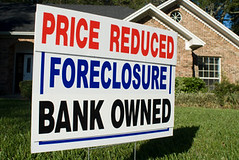The New York Times reports:
After months of painstaking talks, the nation’s biggest banks have agreed to a $25 billion settlement that could provide relief to more than two million current and former American homeowners harmed by the bursting of the housing bubble, state and federal officials said. It is part of a broad government settlement aimed at halting the housing market’s downward slide.
Despite the billions earmarked in the accord, the aid will help a relatively small portion of the millions of borrowers who are delinquent and facing foreclosure. The success could depend in part on how effectively the program is carried out because earlier efforts by Washington aimed at troubled borrowers helped far fewer than had been expected.
Still, the agreement is the broadest effort yet to help borrowers owing more than their houses are worth, with roughly one million expected to have their mortgage debt reduced by lenders. In addition, 300,000 homeowners are expected to be able to refinance their homes at lower rates, while another 750,000 people who lost their homes to foreclosure from September 2008 to the end of 2011 will receive checks for about $2,000.
Fannie and Freddie alone get a $150 billion bail-out, cash money, straight from your hard earned tax dollars. The victims of criminal actions on the part of the mortgage giants, millions of them, get $25 billion, sort of.
Note in the NYT's article, "It is part of a broad government settlement aimed at halting the housing market’s downward slide." The goal of this "settlement," such as it is, is to help the "market." It's anyone's guess whether or not this will actually help the precious market. But $2,000 isn't going to accomplish anything to ease the pain of a family after they've seen their lives destroyed by a bank that's raking in billions in profits every quarter. Don't forget now who it is that has the power in this country. Hint: It isn't you and me.
Conveniently, Yves Smith at Naked Capitalism has listed the top 12 reasons we should hate this mortgage settlement:
1. We’ve now set a price for forgeries and fabricating documents. It’s $2000 per loan. This is a rounding error compared to the chain of title problem these systematic practices were designed to circumvent. The cost is also trivial in comparison to the average loan, which is roughly $180k, so the settlement represents about 1% of loan balances. It is less than the price of the title insurance that banks failed to get when they transferred the loans to the trust. It is a fraction of the cost of the legal expenses when foreclosures are challenged. It’s a great deal for the banks because no one is at any of the servicers going to jail for forgery and the banks have set the upper bound of the cost of riding roughshod over 300 years of real estate law.
2. That $26 billion is actually $5 billion of bank money and the rest is your money. The mortgage principal writedowns are guaranteed to come almost entirely from securitized loans, which means from investors, which in turn means taxpayers via Fannie and Freddie, pension funds, insurers, and 401 (k)s. Refis of performing loans also reduce income to those very same investors.
3. That $5 billion divided among the big banks wouldn’t even represent a significant quarterly hit. Freddie and Fannie putbacks to the major banks have been running at that level each quarter.
4. That $20 billion actually makes bank second liens sounder, so this deal is a stealth bailout that strengthens bank balance sheets at the expense of the broader public.
5. The enforcement is a joke. The first layer of supervision is the banks reporting on themselves. The framework is similar to that of the OCC consent decrees implemented last year, which Adam Levitin and yours truly, among others, decried as regulatory theater.
Read the rest of the list at Naked Capitalism.














